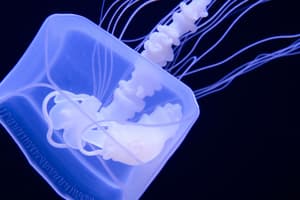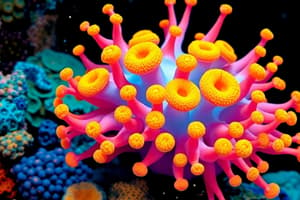Podcast
Questions and Answers
Which of the following are key characteristics of Cubozoa? (Select all that apply)
Which of the following are key characteristics of Cubozoa? (Select all that apply)
- Tentacles found on corners of bell (correct)
- Limited to the coasts of Africa
- Clear, small (correct)
- Box like shape (correct)
What type of reproduction do Cubozoa exhibit?
What type of reproduction do Cubozoa exhibit?
Separately sexed
What are Rhopalia?
What are Rhopalia?
Complex eyes
The life cycle of Cubozoa includes the ______ larva.
The life cycle of Cubozoa includes the ______ larva.
What is the Principle of Parsimony?
What is the Principle of Parsimony?
Study Notes
Key Characteristics of Cubozoa
- Cube-shaped body structure with a box-like appearance.
- Tentacles are located at the corners of the bell, enhancing their predatory capabilities.
- Generally small and transparent, making them less visible in their aquatic environments.
- Comprises around 15-20 distinct species.
- Habitat is primarily confined to the coasts of Australia and New Zealand.
- Known for forming blooms that can disrupt beach activities and pose risks to swimmers.
Reproduction in Cubozoa
- Cubozoa exhibit separate sexes for reproduction, with distinct male and female individuals.
- Undergo direct metamorphosis from the scyphistoma stage to the medusa stage, bypassing intermediary larval forms.
Rhopalia
- Rhopalia are complex sensory structures with advanced ocular features.
- Each rhopalium contains components such as cornea, lens, and retina, interconnected by a network of nerves to enhance vision and environmental perception.
Life Cycle of Cubozoa
- Begins with the planula larva, which is free-swimming and settles to form a polyp.
- The polyp undergoes metamorphosis into the scyphistoma stage.
- Progresses to direct metamorphosis into the medusa form, ready for reproduction.
- Mating occurs between separately sexed individuals with a focus on internal fertilization to enhance offspring viability.
Principle of Parsimony
- A foundational principle in scientific hypothesis testing, advocating for the use of the minimal number of assumptions initially.
- Encourages a systematic approach: first testing the hypothesis that relies on the fewest assumptions before advancing to more complex alternatives.
Studying That Suits You
Use AI to generate personalized quizzes and flashcards to suit your learning preferences.
Description
Test your knowledge on the key characteristics and reproduction methods of Cubozoa. This quiz covers essential terms and concepts related to the box jellyfish, their unique features, and life cycle. Perfect for marine biology enthusiasts!


